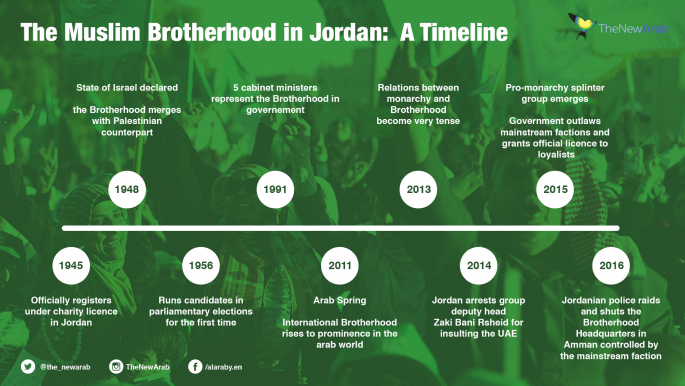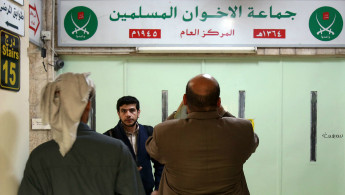Jordan's crackdown on Muslim Brotherhood 'will drive it underground'
Jordan's crackdown on Muslim Brotherhood 'will drive it underground'
Jordan is stepping up restrictions on the mainstream Muslim Brotherhood in favour of a pro-government faction, citing the group's recent 'clandestine' activities, but the Brotherhood vows to fight back 'underground'.
3 min read
The Muslim Brotherhood has been operating publicly in Jordan since 1945 [AFP]
The political space in which the Muslim Brotherhood in Jordan can engage in public activity is shrinking further, as the government cracks down on the mainstream group in favour of a pro-government splinter faction.
On Wednesday and Thursday, the Jordanian government raided the mainstream faction-controlled headquarters in Amman and offices across the kingdom, from Jerash to Madaba, closing them down and forcing leaders into hiding.
The mainstream group, which the Jordanian government outlawed more than a year ago - and instead granting a licence to the rival splinter faction - had reportedly resumed its activities and was preparing internal Shura Council elections for new leaders to succeed outgoing figures.
The governor of Amman, Khaled Abu Zeid, provided no justification for the shuttering of the offices.
But the Brotherhood's campaign of solidarity with the protesters massacred in Cairo - displaying a huge "Rabaa" sign outside the Amman headquarters - could go some way to explain the tension with the Jordanian government, which is allied to the Sisi regime in Egypt.
The closure of the highly symbolic headquarters, one of 39 offices across the kingdom, was heralded last month by a ruling from the governor of Amman, banning the group from holding elections before the term of the Shura Council expired in April.
Crossing red lines
The governor's ruling followed an official complaint by the pro-government faction - freshly licensed in 2015 - headed by Abdul-Majid Thonaibat.
"The illegal group bears full responsibility for having held elections secretly," he told The New Arab. The mainstream Muslim Brotherhood must be banned fully if it carries on with its activities in secret, he said.
On Wednesday and Thursday, the Jordanian government raided the mainstream faction-controlled headquarters in Amman and offices across the kingdom, from Jerash to Madaba, closing them down and forcing leaders into hiding.
The mainstream group, which the Jordanian government outlawed more than a year ago - and instead granting a licence to the rival splinter faction - had reportedly resumed its activities and was preparing internal Shura Council elections for new leaders to succeed outgoing figures.
The governor of Amman, Khaled Abu Zeid, provided no justification for the shuttering of the offices.
But the Brotherhood's campaign of solidarity with the protesters massacred in Cairo - displaying a huge "Rabaa" sign outside the Amman headquarters - could go some way to explain the tension with the Jordanian government, which is allied to the Sisi regime in Egypt.
The closure of the highly symbolic headquarters, one of 39 offices across the kingdom, was heralded last month by a ruling from the governor of Amman, banning the group from holding elections before the term of the Shura Council expired in April.
 |
The Brotherhood's campaign of solidarity with the protesters massacred in Cairo... could go some way to explain the tension |
 |
The governor's ruling followed an official complaint by the pro-government faction - freshly licensed in 2015 - headed by Abdul-Majid Thonaibat.
"The illegal group bears full responsibility for having held elections secretly," he told The New Arab. The mainstream Muslim Brotherhood must be banned fully if it carries on with its activities in secret, he said.
The mainstream Brotherhood refused to accept the governor's decree and held elections as scheduled in the homes of its members, rather than in its offices, according to sources in the group.
A government source speaking on condition of anonymity told The New Arab this was the main reason for the raids on the group's offices, saying the group had crossed all "red lines" by operating underground.
The mainstream Brotherhood said it would appeal the decision both "politically and legally".
"It represents an onslaught by the executive branch over the judiciary, which has already overturned a request by Thonaibat's group to take control of the headquarters."
"This is a return to the days of martial law," the statement added.
 |
This is a return to the days of martial law in Jordan - Mainstream Muslim Brotherhood |
 |
The Brotherhood intends to press ahead with Shura elections, sources in the outlawed group told The New Arab.
On Wednesday evening, the head of the group, Hammam Said, called on members to close ranks, as allied activists launched a social media campaign in solidarity, using hashtags including #My_Home_Your_Headquarters.
The activists pledged to continue their activity, despite the government's move, hinting that the Muslim Brotherhood could pursue a new, clandestine direction, after 70 years of public activity in Jordan.
The recent tensions between the Muslim Brotherhood and Jordan date back to early 2011, when the group spearheaded protests in the kingdom demanding Arab Spring-style reforms to the regime, including reducing the powers of the king, fighting corruption and advancing social justice.
 |
|



